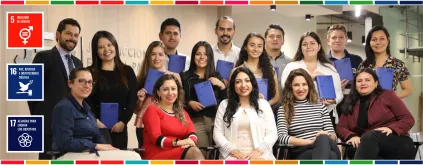University students serving as United Nations Volunteers contribute to the transitional justice system in Colombia through the implementation of the Sustainable Development Goals (SDGs) 5 (gender equality), 16 (peace, justice and strong institutions) and 17 (partnerships). This collaborative effort aims to support the creation of a fairer, more equal and peaceful Colombian society.
The commitment of UN Member States to leaving no one behind requires mechanisms that will contribute to the creation and stabilization of peaceful, fair and equal societies. Over the next decade, such mechanisms will prove essential in the realization of the 2030 Agenda and the Sustainable Development Goals, in particular SDG 16, which encompasses promoting the rule of law at national and international levels and ensuring equal access to justice for all.
In alignment with its commitment to build a fairer society, the Colombian State strives to consolidate an inclusive and efficient judicial system – one that observes due process and provides timely responses to victims and perpetrators alike, while also overcoming institutional weaknesses and strengthening the rule of law throughout the territory.
The Special Jurisdiction for Peace (JEP), an independent court established under the Peace Agreement between the Colombian State and the former guerrillas of the FARC EP, represents the justice component of the Comprehensive System for Truth, Justice, Reparations and Non-Recurrence (SIVJRNR for its acronym in Spanish). The JEP has been in place in Colombia for more than two years, and is responsible for investigating, prosecuting and punishing those who committed the most serious crimes during the armed conflict.
Volunteers at the Tribunal for Peace
The JEP guarantees the rights of victims right to justice, offers truth to Colombian society, contributes to the stabilization and consolidation of peace, and issues decisions that grant absolute legal certainty to both direct and indirect participants of the armed conflict. In pursuit of these objectives, this new transitional justice system seeks to improve the weaknesses of the Colombian judicial system, such as court congestion, lack of follow-up on notices and slow processing.
To meet the target established in 2019 to process more than 4,500 court proceedings, management reports, releases and rulings, the Judicial Secretary of the JEP counts on the support of the Norwegian Embassy, as well as ten UN Volunteers with the UN Development Programme (UNDP) – six women and four men studying law at various Colombian Universities, including Jorge Tadeo Lozano University and the Agrarian University of Colombia.
These young people – in their last semesters of college and within the first year after graduation – are responsible for administrative work, as well as sending out notices from the different Chambers and Sections to resolve delays and the backlog associated with the service and distribution of applications filed with the JEP.
For Ingrid Karola Palacios, General Judicial Secretary of the JEP, the team of volunteers from the United Nations "not only solved congestion at the office, but was also decisive for making progress with the decisions made by the judges, protecting the rights of victims and claimants and contributing to the fulfillment of the Court's objectives towards a stable and lasting peace."
The final management report submitted by the JEP highlights the importance of the volunteers' work and their successes. Exceeding the initial target set by the Court by 164 per cent, the UN Volunteers demonstrated their potential and their strong commitment towards the implementation of the 2030 Agenda, which seeks to transform the world in which we live by serving the most vulnerable.
As many of the victims of the armed conflict were part of indigenous, Afro-Colombian and Razial groups, the volunteers ensured that the ways in which they attended to the victims respected this diversity, and they accordingly applied gender and ethnicity-based perspectives.
Laura Patiño is a UN Volunteer with the Judicial Secretary of the Amnesty and Pardons Chamber, which is responsible for issuing amnesties or pardons to former members of the defunct FARC-EP guerrilla who committed political crimes (as long as they contribute to the truth and refrain from committing other crimes, among others). She shares that "the work of young people within these state entities makes it possible to create spaces of discussion that will ultimately strengthen these entities and civil society in general. While on assignment, I managed to push 167 proceedings forward, which means that the proceedings for 167 ex-combatants will be resolved sooner and will fulfill the victims' rights to truth, justice and non-repetition."
Juan Felipe Ramos, a UN Volunteer at the Judicial Secretary, describes his experience as follows: "It was very satisfying to contribute to the strengthening of peace in Colombia and to the fulfillment of the objectives set out by the Special Jurisdiction for Peace, given that it will ultimately have an impact on the development of the country and the construction of a less violent society."
In addition to the work done by the volunteers, the support of donors such as the Norwegian government through its Embassy in Colombia, the UNDP and the UN Volunteers (UNV) programme over the six-month timeframe was fundamental in making this project a reality.
As this collaboration elucidates, programmes and projects that encourage partnerships among different types of organizations in order to strengthen institutions and civil society are conducive to driving change and structural transformations in Colombia.
This article was prepared with the kind support of Online Volunteer Kaylin Lang.

